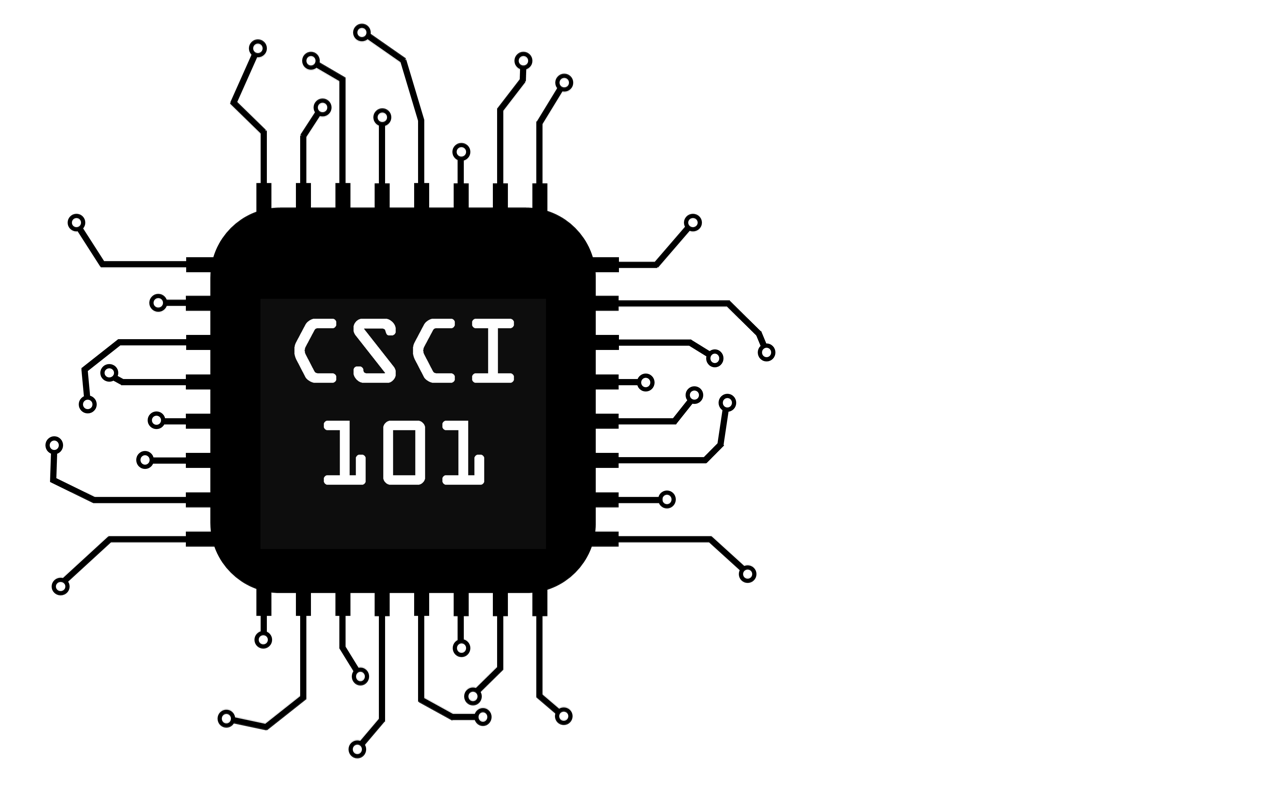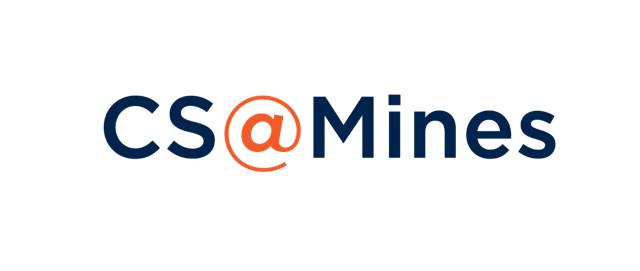CSCI 101 - Intro to Computer ScienceFall 2021 - SyllabusQuick Links: zyBook | Piazza | Gradescope | Canvas | CS @ Mines |
|||||||||||||||||||||
| | Home | Contact | Schedule | Assignments | Syllabus | | |||||||||||||||||||||
Syllabus
Course Description:
This course is an introduction to the building blocks of Computer Science. Students will engage in activities that show how computing changes the world and impacts daily lives. Topics include conventional algorithm design and efficiency, computer hardware, operating systems, computer networking, cybersecurity and privacy, artificial intelligence, and programming languages. Various optional topics in computer science are discussed as well, depending on the semester. A popular procedural programming language (Python) will also be used by students with assignments that explore the topics discussed in class. There are no prerequisites for this course. If you are new to programming, then you must enroll in the LAB course associated with this class (CSCI 102). In other words, students in CSCI 101 who are not in CSCI 102 should start the semester with significant prior experience programming in some language. If interested in more details on what we'll cover in this course, see the list of Course Topics.
Main Required Book (purchase electronically):
Our main textbook this semester is an electronic book called CSCI 101: Introduction to Computer Science, which was created specifically for this course. Our zyBook contains material from four zyBook titles:
Optional Book (if you also want a hard copy of a book):
The following textbook covers most of the material in the zyBook and more. We will cover some material from this textbook in class. Copies of this book available in the Arthur Lakes Memorial Library.
Course Objectives:
The objectives of this course are to introduce students to the field of computer science. At the end of this course, students will be able to:
Computer Facilities and Assistance:
You need a Mines multipass account to use the lab machines available across campus. If you do not have this account, visit https://identity.mines.edu. If you have trouble, contact the Computer Commons Help Desk in room 156A of CTLM. We will use the Python 3 programming language, which we suggest you install on your home machine. We will provide instructions for doing so in CSCI 102 and will assist any student installing on their laptop.
Student Evaluation: There is a total of 1000 points in this course. Grades will be assigned on the following basis:
* some Python Labs and homework assignments will be worth more than others ~ all Python assignments will be graded using Python 3 Quizzes: We will have several quizzes throughout the semester, with most given at the start of class (which means you don't want to be late!). The purpose of the quizzes is to ensure you are keeping up with course material, especially the assigned readings and videos. Good news: half the daily quiz points are earned just by taking the quiz! Explore/Create Projects: You’ll work on the Explore Project the first half of the semester and the Create Project the second half of the semester (both of which are projects in the AP Computer Science Principles course). The Explore Project has you explore, present, and write about a computing innovation of your choosing. The Create Project has you create a final Python project, again of your choosing. These projects are pretty open-ended, allowing you to choose both the area of interest to focus on and the level of difficulty to take that focus. We encourage students with prior computing experience to go big! Python Labs: These labs will be smaller in nature than the Create Project, each with a goal for you to practice some feature of the Python language. Homework: This category is for all the other miscellaneous assignments that you'll do this semester. Exams: We’ll have two exams during the semester, as well as a Python language exam (toward end of semester) and a final (cumulative) exam. zyBooks chapters will be assigned each week. Students should complete the chapters as they are assigned. Participation AND challenge problems count toward completion. These grades will be posted on a per-chapter basis, checked after we complete each unit. Expectations: You are expected to attend all classes and come prepared to actively participate in the activity and discussion for the day. Your attendance is important for several reasons:
Final Grades: Your final grade will be determined using a straight scale. The straight scale assigns letter grades as follows:
Submission/Grading Information:
Course Support:
Learning Environment:
Fundamentally, we expect and require respect in this course for yourself, your classmates, and the 101/102 Team.
Disability Support Services:
The Colorado School of Mines is committed to ensuring the full participation of all students in its programs, including students with disabilities. If you have been approved for accommodations with Disability Support Services (DSS), request that your instructor receives details on your accommodations through the Accessible Information Management (AIM) system. Then, contact your instructor to (1) ensure your accommodation letter has been received and (2) discuss your needs. For questions or other inquiries regarding disabilities, we encourage you visit Disability Support Services (DSS) for more information.
Accessibility within Canvas:
If interested, read the Accessibility Statement from Canvas to see how the learning management system at the Colorado School of Mines is committed to providing a system that is usable by everyone. The Canvas platform was built using the most modern HTML and CSS technologies, and is committed to W3C's Web Accessibility Initiative and Section 508 guidelines.
Academic Integrity:
Our full Academic Integrity policy and Guidelines are available on this page. Students are advised to be familiar with these policies.
Discrimination, Harassment, and Title IX:
All learning opportunities at Mines, including this course, require a safe environment for everyone to be productive and able to share and learn without fear of discrimination or harassment. Mines’ core values of respect, diversity, compassion, and collaboration will be honored in this course, and the standards in this class are the same as those expected in any professional work environment. Discrimination or harassment of any type will not be tolerated. As a participant in this course, we expect you to respect your instructor and your classmates. Your instructor has the responsibility to foster a learning environment that supports diversity of thoughts, perspectives and experiences, and honors your identities. If something is said or done in this course (by anyone, including your instructor) that made you or others feel uncomfortable, or if your performance in the course is being impacted by your experiences outside of the course, please report it to:
It's on us, all of the Mines community, to engineer a culture of respect.
Diversity and Inclusion:
At Colorado School of Mines, we understand that a diverse and inclusive learning environment inspires creativity and innovation, which are essential to the engineering process. We also know that in order to address current and emerging national and global challenges, it is important to learn with and from people who have different backgrounds, thoughts, and experiences. Our students represent every state in the nation and more than 90 countries around the world, and we continue to make progress in the areas of diversity and inclusion by providing Diversity and Inclusion programs and services to support these efforts.
Absence Policy:
The Student Absences webpage outlines CSM's policy regarding student absences. It contains information and documents to obtain excused absences. Note: All absences that are not documented as excused absences are considered unexcused absences. Your instructor may deny a student the opportunity to make up some or all of the work missed due to unexcused absence(s) OR may grant a student permission to make up missed academic work for an unexcused absence. Your instructor may consider your class performance, as well as your attendance, in this decision. In the case of an absence, the student is responsible for determining what work was missed and for putting forth a good faith effort to review the material on their own.
Maintenance/Legal Clause:
This syllabus is intended to give students guidance on our course this semester and will be followed as closely as possible. The lead course professor reserves the right to modify, supplement and make changes as the course needs arise. This syllabus is not a legal document; common sense rules always apply, e.g., no late assignments will be accepted after the solutions are discussed in class.
Oredigger Promise - Our Climb Continues:
We made it through the 2020-21 school year together, on campus and in person, and we can do it again this year. But just as global data trends show us the pandemic isn’t over, we also know it will take a shared commitment from us all to safely navigate the year As our understanding of the virus increases and variants take center stage, our commitment to protecting our community needs to evolve. This year’s Oredigger Promise reflects this evolution as well as our continued need to climb together and protect our classmates and colleagues, our families and neighbors. Therefore, as a member of the Oredigger community, I promise to protect classmates and colleagues, our families and neighbors, and myself by adopting the practices and attitudes summarized below; I will:
CARE @ Mines:
If you feel overwhelmed, anxious, depressed, distressed, mentally or physically unhealthy, or concerned about your wellbeing overall, there are resources both on- and off-campus available to you. If you need assistance, please ask for help form a trusted faculty or staff member, fellow student, or any of the resources below. As a community of care, we can help one another get through difficult times. If you need help, reach out. If you are concerned for another student, offer assistance and/or ask for help on their behalf. Students seeking resources for themselves or others should visit care.mines.edu. Additional suggestions for referrals for support, depending on comfort level and needs include:
All of these options are available for free for students. The Counseling Center, Health Center, and Colorado Crisis Services are confidential resources. The Counseling Center will also make referrals to off-campus counselors, if preferred. In an emergency, you should call 911, and they will dispatch a Mines or Golden PD officer to assist. 

| |||||||||||||||||||||
